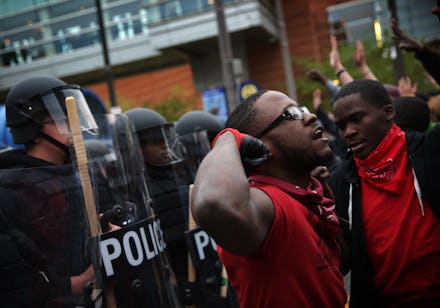One Tweet Shows the Hypocrisy of the Media's Reaction to Riots in Baltimore

For up-to-date information about the escalating situation in Baltimore, see Mic's coverage here.
On Saturday, over 2,000 protesters marched to Baltimore's City Hall to protest the death of 25-year-old black man Freddie Gray. Gray died on April 19 after suffering a spinal injury while in Baltimore Police Department custody a week earlier. At some point between when Gray was put into a police van and shackled and the time paramedics were called over half an hour later, something nasty happened.
According to Gray's family attorney, his spine was 80% severed at the neck. Deputy Police Commissioner Jerry Rodriguez admits that Gray gave up without the use of force.
Since then, thousands of people have taken to the streets every day to demonstrate against the fate that befell Freddie Gray and countless other people who have been killed by police in America. But on Saturday night, a small minority of Baltimore's residents decided to irresponsibly engage in property destruction and acts of violence — and the media lost its mind.
Here's how the Baltimore Sun covered the events on Sunday:
One tweet from American hip-hop artist Talib Kweli shows how the protests could and should have been covered: as a movement against police brutality so heartfelt and widespread that it united even rival gangs.
A "war zone": One could practically sense right-wing media hooting with glee at Baltimore's pain. Drudge Report's eponymous Matt Drudge was quick to play up the racial angle:
Breitbart ran headlines referring to "1,000 black rioters" and called the city a "war zone." CNS News wrote on how "the demonstration turned violent and volatile," while the Daily Caller played up a viral video showing a group of young black guys stealing a reporter's purse:
A false narrative: The vast majority of people who turned out to protest Freddie Gray's death on Saturday didn't engage in violence, smash windows or hurl beer bottles at people. Out of the more than 2,000 people who marched to City Hall that afternoon, Al-Jazeera America reports that about 100 were responsible for the chaos. CNN noted that there was an "overwhelming peaceful majority" and that members of protests put themselves between the "small group" of angry demonstrators and police lines, leading Police Commissioner Anthony Batts to thank the peacemakers in the crowd.
Despite the fact that there have been peaceful protests in Baltimore every day since Gray died on April 19, some folks seem determined to frame the narrative around the actions of a disgruntled minority.
As Mic's Zak Cheney-Rice previously pointed out while covering the protests in Ferguson, Missouri over the death of 18-year-old unarmed black man Mike Brown at the hands of police, somehow the media doesn't react with the same kind of breathless denunciations when white college students turn unruly:
The narrative coalescing around some of the nastier things that happened in Baltimore on Saturday is easily distorted. City Paper's Brandon Soderberg, for example, explained the backstory of Drudge's "race riot" photo:
The Wall Street Journal's Christopher Mims chimed in:
Somehow, photos of peaceful protesters intervening — the same peacemakers the police commissioner credited with helping to neutralize the angry minority — aren't getting the same coverage.
Lost in all this, too, is how a few scuffles and broken windows pale in comparison to the violence visited upon Freddie Gray by the Baltimore Police Department:
The Department of Justice is not only investigating Gray's death, but reviewing the entire police force after years of allegations of brutality.
Why you should care: Disproportionate focus on the violent actions of a few hurt, pained and disenfranchised people unfairly ignores the much larger peaceful movement protesting Gray's death. It paints an entire minority community as intrinsically violent and unreasonable when, in fact, they are the ones under siege by a police department that has paid out millions of dollars to the plaintiffs of excessive force lawsuits. Officers in Baltimore have been accused of vicious misconduct on a regular basis.
"Please don't allow a few angry protesters shift the focus of what created this movement in the city," local activist Albert Phillips wrote on Facebook. "Rioting and looting is only a reaction to compounded injustice. The larger issue here is police brutality. Stay focused."
When the police have so clearly lost the trust of the public, there's a bigger problem than one night of rioting at hand. Baltimore's residents deserve better than for the nation to ignore that problem.